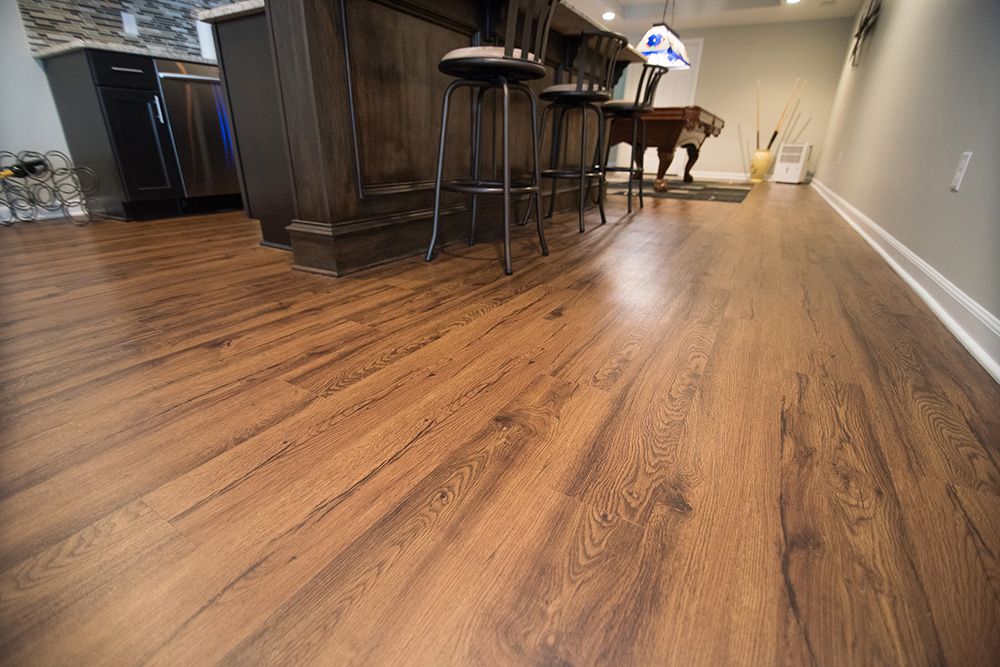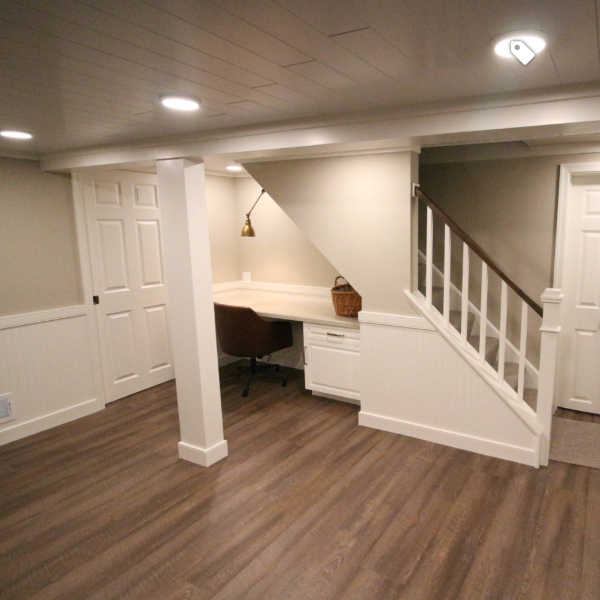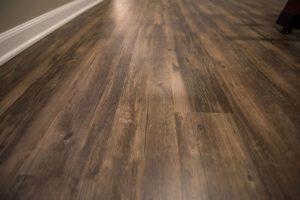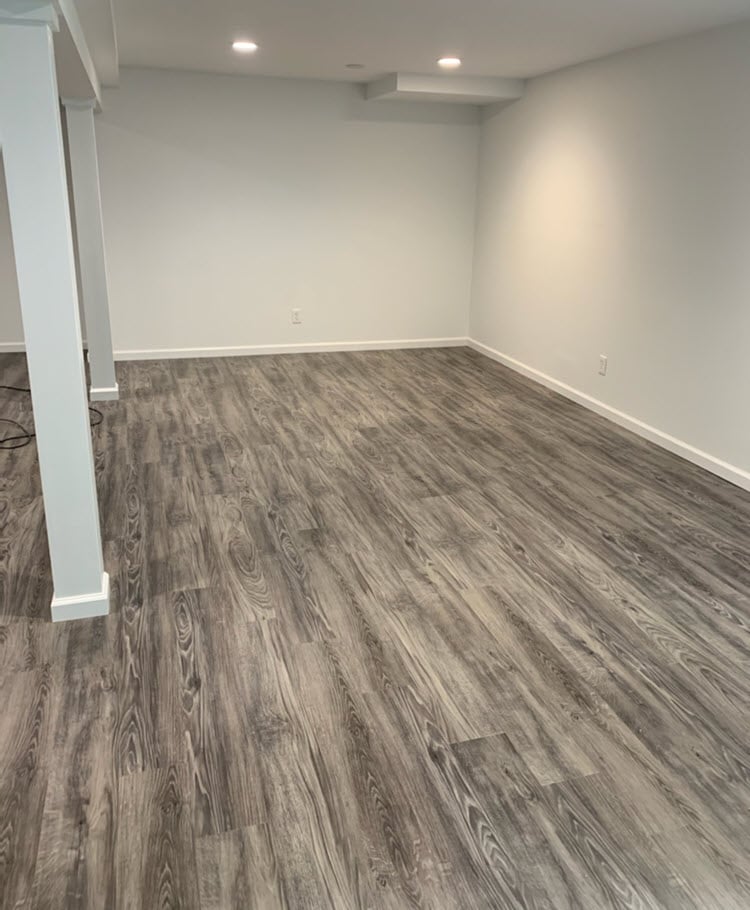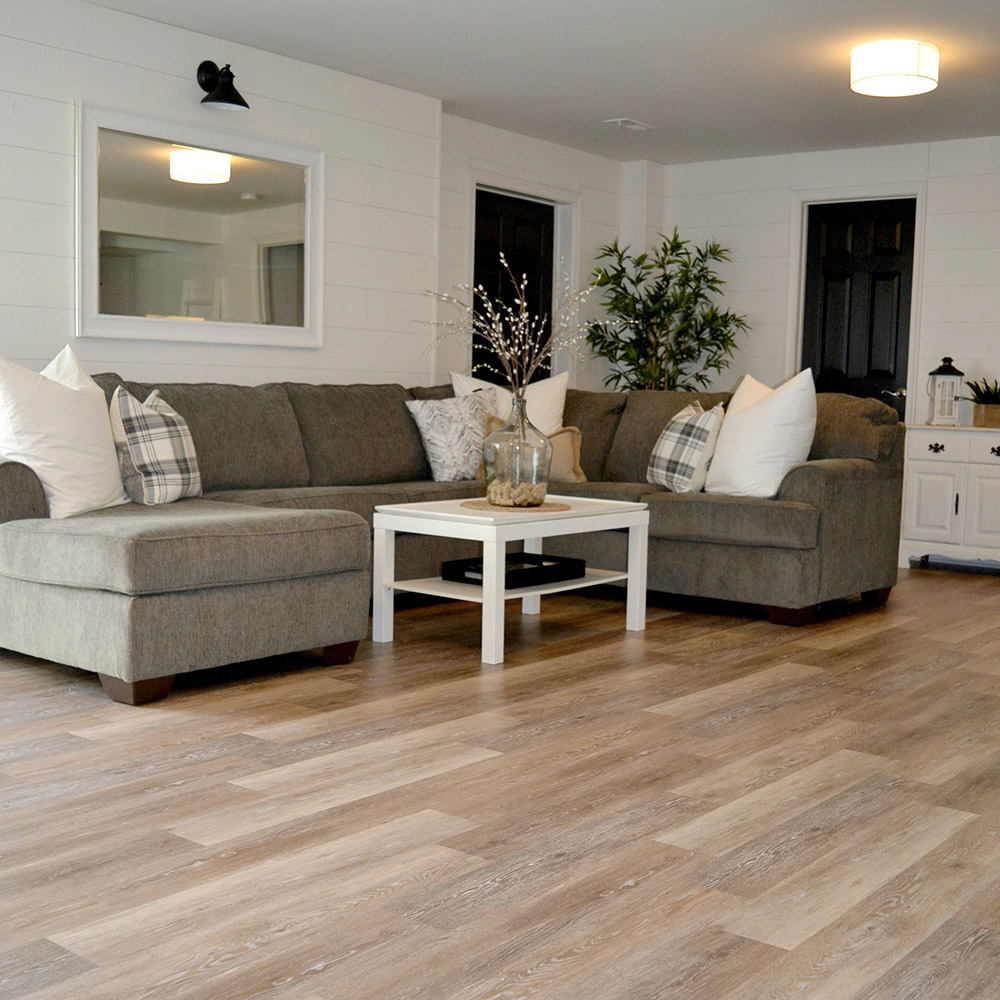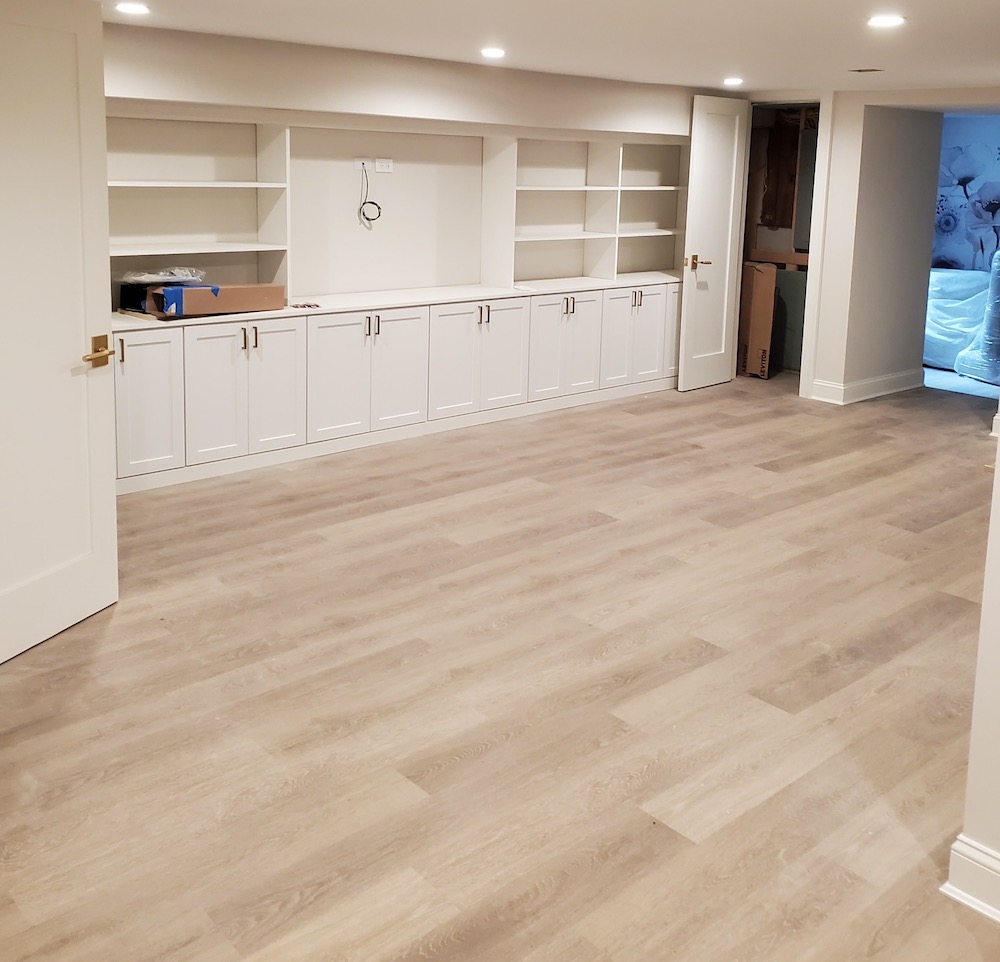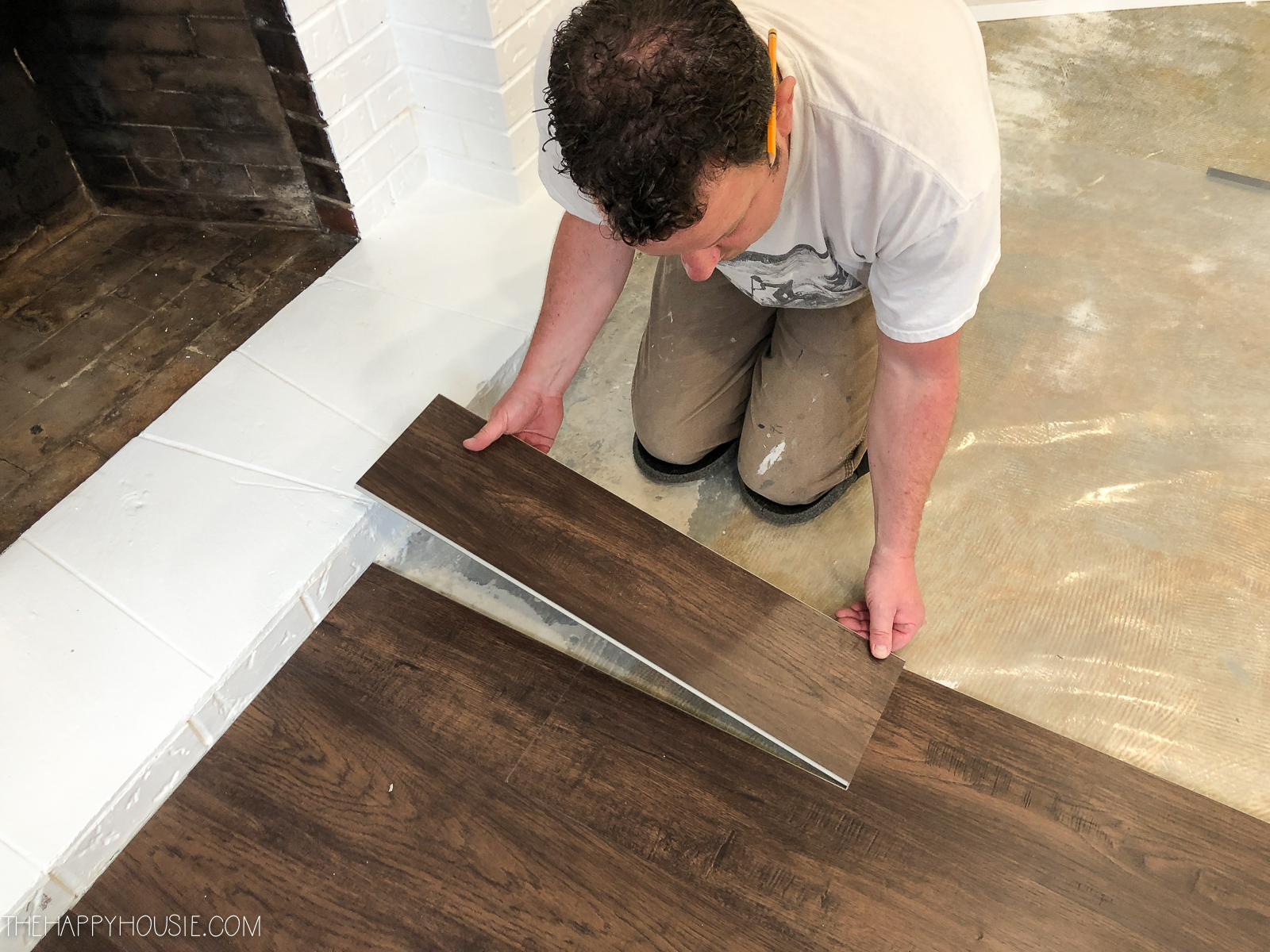Why Vinyl Tile is a Great Option for Basement Flooring
When it comes to choosing flooring for basements, vinyl tile stands out as a top contender. Basements are often prone to moisture and temperature fluctuations, which makes choosing durable and moisture-resistant flooring essential. Many homeowners have turned to vinyl tile for its versatility, ease of installation, and ability to withstand the unique challenges that come with basement environments.
- Moisture Resistance
Vinyl tile is known for its moisture resistance, which is a key factor in basements. Basements often have higher humidity and moisture levels, which can lead to warping, mold, or mildew with other types of flooring. Vinyl tile is typically water-resistant or even waterproof, making it a great choice for a basement floor that might occasionally get damp. - Comfort Underfoot
Unlike concrete or ceramic, vinyl tile offers a more comfortable surface to walk on. Many vinyl tiles come with a bit of “give,” creating a softer feel underfoot. This is especially welcome in a basement, where the floors are generally colder and harder. - Wide Range of Styles
One of the biggest advantages of vinyl tile is its versatility in terms of style. You can find vinyl tiles that mimic the look of wood, stone, or ceramic tile, offering plenty of options to match your aesthetic. Whether you want a modern, rustic, or industrial feel, there’s likely a vinyl tile that fits the look you’re going for. - Easy to Maintain
Basements can get dusty, and spills may happen if the space is used for storage or as a recreational area. Vinyl tile is easy to clean and maintain. Regular sweeping and occasional mopping is usually all that’s needed to keep it looking great, making it a low-maintenance choice for basement floors. - Durability and Longevity
Vinyl tile is built to withstand heavy foot traffic and is designed to resist scratches, scuffs, and stains. In basements, which might be used for storage or home gyms, durability is essential. Vinyl tile can handle the wear and tear that comes with these activities. - Affordable and DIY-Friendly
Installing vinyl tile is often a straightforward process, and many homeowners find they can tackle it themselves. This can save on labor costs, making vinyl tile an affordable option that’s budget-friendly while still providing a stylish and durable floor.

Types of Vinyl Tile for Basement Floors: Choosing the Right Style
Vinyl tile comes in a variety of styles, each suited to different needs and aesthetics. Understanding the types available can help you make an informed decision that aligns with your basement’s purpose and design vision.
Luxury Vinyl Tile (LVT)
Luxury vinyl tile, or LVT, is a high-end option that closely resembles natural materials like wood and stone. It’s thicker and more durable than standard vinyl and offers a premium look that elevates the aesthetic of any basement space. LVT is ideal if you want a sophisticated, realistic appearance with the practicality of vinyl.
Vinyl Composition Tile (VCT)
VCT is commonly used in commercial settings but can be an excellent choice for basements. It’s typically more affordable than LVT and offers a durable surface that can handle heavy use. VCT does require regular waxing for maintenance, but its lower cost makes it appealing for those looking to cover a large basement area.
Self-Adhesive Vinyl Tiles
Self-adhesive vinyl tiles are convenient and easy to install, often used by DIY enthusiasts. These tiles come with a peel-and-stick backing, making the installation process quick and simple. They’re available in many designs, allowing you to create custom patterns or replicate the look of more expensive materials.
Rigid Core Vinyl Planks
If your basement has uneven floors, rigid core vinyl planks may be an ideal choice. They feature a sturdy, durable core that hides imperfections in the subfloor, providing a smooth surface. This type is often waterproof and highly durable, making it well-suited to the demands of a basement environment.
Loose-Lay Vinyl Tiles
Loose-lay vinyl tiles are designed to be laid without adhesive, relying on their weight and friction to stay in place. They’re easy to install and replace, which can be a benefit in a basement where occasional flooding may require tile replacement.
Stone-Look and Wood-Look Vinyl
Vinyl tiles are available in designs that mimic natural materials like stone and wood. This is ideal if you’re looking to achieve a specific style in your basement, such as a rustic wood look or a classic stone appearance, without the high cost or maintenance requirements.
Benefits of Vinyl Tile for Basements: Durability, Water Resistance, and More
Choosing vinyl tile for a basement brings a range of practical benefits, from its durability to its moisture resistance. Here’s why vinyl tile is one of the best choices for a basement floor that will last.
Exceptional Water Resistance
Vinyl tile is typically water-resistant or even fully waterproof, which is crucial for basements that are susceptible to dampness or minor flooding. This feature alone makes it a smart choice, helping to avoid issues like mold, mildew, and warping.
Resistant to Scratches and Stains
Vinyl tile is designed to be scratch-resistant and stain-proof, which means it can handle everything from heavy foot traffic to accidental spills. This makes it ideal for basements that are used for activities like exercising, crafting, or as a playroom for kids.
Thermal Insulation
Basements tend to be cooler than the rest of the house, and vinyl tiles provide a bit of insulation, making the floor feel warmer. Some types of vinyl tile are compatible with radiant heating systems, adding warmth and comfort to a space that’s often naturally cold.
Easy to Replace Damaged Tiles
In the event of damage, individual vinyl tiles are relatively easy to replace. This is a major plus for basement floors, as it means you don’t need to replace the entire floor if only a few tiles are affected.
Cost-Effective Durability
Vinyl tile offers long-lasting performance at an affordable price point. Unlike other flooring materials that may require refinishing or frequent replacement, vinyl tile remains in good shape with minimal upkeep.
Wide Design Range
You don’t have to compromise on style when choosing vinyl for the basement. The extensive range of designs means you can create a look that matches the rest of your home or create a unique space with a distinctive feel.
Installation Tips for Vinyl Tile in Basements
Installing vinyl tile in a basement is typically a straightforward process, but there are a few steps you’ll want to follow to ensure a lasting and secure installation.
Prepare the Subfloor Properly
A clean, level subfloor is essential for vinyl tile installation. Be sure to remove any dirt, dust, or debris, and repair cracks or dips. A level surface helps prevent uneven areas and makes the vinyl tiles more durable.
Allow for Acclimation Time
Vinyl tiles need time to acclimate to the basement’s temperature and humidity levels before installation. Let the tiles sit in the basement for at least 24 hours before installing them. This helps prevent issues with expansion and contraction over time.
Use a Vapor Barrier if Needed
Depending on the moisture levels in your basement, you may want to consider a vapor barrier. This additional layer can help protect the vinyl from any moisture that may seep through the concrete floor.
Consider Starting from the Center
When laying tiles, starting from the center of the room and working your way out can help ensure a balanced, even look. This is especially important if you’re working with a patterned tile or want to achieve a specific layout.
Roll the Floor After Installation
Once the tiles are in place, use a floor roller to press down on the tiles. This ensures a firm, even adhesion and reduces the risk of tiles shifting or lifting over time.
Seal the Edges
For extra protection, especially against moisture, consider sealing the edges of the floor with caulk. This can prevent water from seeping underneath the tiles, which is particularly important in basements.
Maintaining and Cleaning Vinyl Tile Basement Flooring
Vinyl tile is low-maintenance, but a little regular care will keep it looking its best for years. Here’s how to keep your vinyl basement floor clean and damage-free.
Regular Sweeping or Vacuuming
Dust and dirt can accumulate on basement floors. Regular sweeping or vacuuming prevents dirt from scratching the surface of the vinyl tile and keeps it looking polished.
Use a Damp Mop
Mopping with a damp mop and a mild cleaning solution is usually all that’s needed to clean vinyl tile. Avoid soaking the floor, as excessive water can damage some types of vinyl over time.
Avoid Abrasive Cleaners
Stick to mild, non-abrasive cleaners to prevent scratching. Harsh cleaners and scouring pads can dull the finish on vinyl, so it’s best to avoid these entirely.
Promptly Clean Spills
If your basement is used as a recreational space, spills may occur. Clean spills immediately to prevent staining and to maintain the tile’s appearance.
Consider Applying a Floor Polish
Some vinyl floors benefit from an occasional application of a floor polish designed for vinyl. This can help protect the surface from scratches and make it easier to clean.
Replace Damaged Tiles as Needed
One of the perks of vinyl tile is that damaged tiles can be replaced individually. If you notice any wear or damage, simply remove and replace the affected tile rather than redoing the entire floor.
Cost Considerations: Is Vinyl Tile an Affordable Option for Basements?
Vinyl tile is often chosen for its affordability, but there are factors to consider to ensure it’s the best option for your budget and needs.
Initial Material Costs
Vinyl tile is generally more affordable than other basement flooring options like hardwood or ceramic. Costs vary based on the type, with luxury vinyl tile (LVT) being more expensive than standard peel-and-stick options.
Installation Costs
DIY installation can save you significant labor costs, which makes vinyl tile an appealing choice. If you choose a professional installation, the total cost will increase, but vinyl tile is often easier and less costly to install than other flooring types.
Maintenance Savings
Vinyl tile requires minimal maintenance, which saves money over time. Other types of basement flooring may need more intensive upkeep, like refinishing or resealing, which adds to the long-term costs.
Durability and Replacement Costs
Since vinyl tile is durable, it doesn’t need frequent replacement. Even if a tile gets damaged, it’s easy and inexpensive to replace individual tiles instead of redoing the entire floor.
Energy Efficiency
Vinyl tiles provide some insulation, which could reduce heating costs in a basement. Certain tiles are also compatible with radiant heating systems, which could add upfront costs but save on energy bills in the long run.
Variety for Every Budget
With so many types available, there are vinyl tile options for every budget. Whether you’re looking for an affordable peel-and-stick style or a high-end luxury tile, there’s likely an option that fits your financial plan and your basement’s needs.
Flooring Ideas for a Basement
How to Install Vinyl Plank over Concrete (ORC Week 4/5) The
Related Posts:
